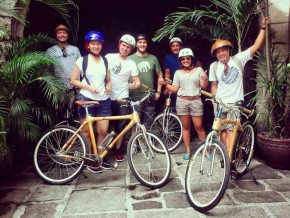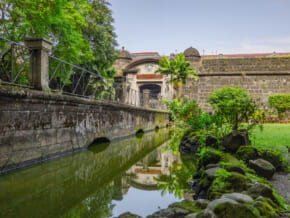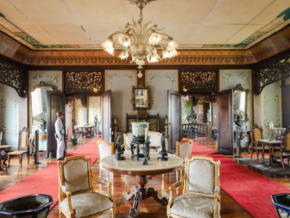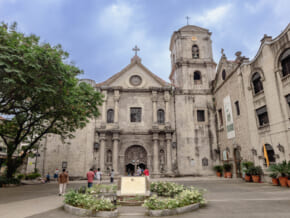JAPAN TRAVEL: Get to Know Gujo City—The Stress-Relieving ‘Water City’
Gujo is a small city with the enduring appeal of a traditional Japanese old town. Rivers and streams of clean, fresh water run across the city like veins that pump life to Gujo’s local industries of food and agriculture. For this quality, Gujo has been dubbed as the Water City of Japan. A walk along its streets, lulled by the nearby streams, is an unflagging source of comfort to visitors that seek refuge from stress.
 Riverside houses in Gujo Hachiman are a refreshing scenery from the looming skyscrapers in metropolitan cities.
Riverside houses in Gujo Hachiman are a refreshing scenery from the looming skyscrapers in metropolitan cities.
Gujo City is in central Gifu Prefecture. If you are headed to Takayama from Nagoya, it is ideal to stop by and first explore Gujo, which is also a nice old-town destination just like Takayama. Old wooden structures are on every street, where you might stumble upon little restaurants and snack shops, candy stores, and even fashion and accessory shops with beautifully handmade products.
Gujo Hachiman
 Miyagase Bridge is one of the many bridges over Yoshida River in Gujo Hachiman.
Miyagase Bridge is one of the many bridges over Yoshida River in Gujo Hachiman.
Gujo Hachiman is perhaps the most resounding out of all the villages in Gujo City. The village is at the core of Gujo’s history, representing the city as an old castle town.
 Arching over Kodara River, Shimizu Bridge is perhaps the most famous bridge in Gujo Hachiman.
Arching over Kodara River, Shimizu Bridge is perhaps the most famous bridge in Gujo Hachiman.
While walking around Gujo Hachiman, you can see a glimpse of Hachiman Castle seated atop a mountain, watching over the city. Another fascinating area is the picturesque Shimizu Bridge where you can find traditional riverside houses.
 One can appreciate the modest way of life in Gujo City.
One can appreciate the modest way of life in Gujo City.
Exploring Gujo Hachiman by foot is highly recommended. Walking around the village, you can see and appreciate the modest way of life and can’t help but be thankful that such places are well-preserved by the communities that reside in them.
Gujo Hachiman Information
Address: 520-1, Shimadani, Hachiman-cho, Gujo City, Gifu Prefecture (Gujo Hachiman Tourism Association)
Website: www.gujohachiman.com/kanko/index_e.html
Also read: Gujo Hachiman Hakurankan Museum in Japan: A Glimpse of Gujo
Ryukyo no Sato
 Ryukyo no Sato has a seating capacity of 200.
Ryukyo no Sato has a seating capacity of 200.
Ryukyo no Sato in Gujo Hachiman is an ideal stopover for souvenir shopping and dining. It houses a spacious shopping facility with a small café on the first floor, and upstairs a restaurant that is the biggest in Gujo Hachiman.
 Keichan, part of Setoukei Guai Set at Ryukyo no Sato.
Keichan, part of Setoukei Guai Set at Ryukyo no Sato.
The restaurant boasts such local specialties as keichan, pan-fried native chicken mixed with vegetables and a miso-based sauce that boosts the flavor and aroma of the meat. There are also other Gifu gourmet food like Hida beef and Mino Ken pork.
Ryukyu no Sato Information
Address: 166 Tatei-machi, Hachiman-cho, Gujo City, Gifu Prefecture
Hours: Souvenir shop: 10 am to 6 pm | Restaurant: 11 am to 3 pm *Last order 2:30 pm
Website: www.ryukyonosato.jp/restaurant/
Sample Village Iwasaki
 Don’t be fooled—this is fake food!
Don’t be fooled—this is fake food!
Walking by restaurants in Japan, have you ever wondered where those fake food displays come from? There is a great chance that they came from Gujo City, the fake food capital of Japan. A native of Gifu, Takizo Iwasaki is recognized as the father of the fake food industry, which began in the early 1920s.
 Feel like a chef creating food replicas in a fake food making workshops at Sample Village Iwasaki.
Feel like a chef creating food replicas in a fake food making workshops at Sample Village Iwasaki.
Founded by Takizo Iwasaki, Iwasaki Mokei or Sample Village Iwasaki offers an amusing experience of learning about the history and production of food replicas. A unique experience is making your own food replica.
The workshop area resembles a fully-equipped kitchen, where you might find workshop participants in aprons working like a chef’s protégés. After the workshop, you can take your finished masterpiece and even bring more home from the souvenir shop.
Sample Village Iwasaki Information
Address: 250 Gunan-cho, Hachiman-cho, Gujo City, Gifu Prefecture
Hours: 10 am to 4 pm *Sample food workshop until 3 pm only; closed on 1st Thu of Oct, 1st Sat of Feb & holidays
Website: iwasakimokei.com
Also read: Fake Food 101: Make Your Own Wax Food in Gujo, Japan
Gujo Odori Festival
 Gujo Odori Festival lets you experience the vibrant and amiable community of Gujo. /IMAGE 郡上八幡観光協会 Gujo Hachiman Tourism Association Facebook
Gujo Odori Festival lets you experience the vibrant and amiable community of Gujo. /IMAGE 郡上八幡観光協会 Gujo Hachiman Tourism Association Facebook
Gujo Odori Festival, celebrated for 31 festive nights from mid-July to early September, lets you experience the vibrant and amiable community of Gujo. Its beginnings can be traced four centuries back. A designated Significant Intangible Cultural Folk Asset, Gujo Odori is one of the three biggest Bon festivals in Japan.
 Visitors are welcome to join the dancing during the Gujo Odori Festival. /IMAGE 郡上八幡観光協会 Gujo Hachiman Tourism Association Facebook
Visitors are welcome to join the dancing during the Gujo Odori Festival. /IMAGE 郡上八幡観光協会 Gujo Hachiman Tourism Association Facebook
The highlight of Gujo Odori is Tetsya Odori, where the local community dances from dusk until dawn for four nights in the mid-August. Visitors are welcome to join. To make your experience of being part of the festival more authentic, you can try wearing a yukata and geta (Japanese wooden sandals), which can be rented at local kimono shops.
Gujo Odori Festival Information
Location: Gujo Hachiman (Venues vary according to activity)
Festival Dates: July 13 – September 7, 2019
Getting to Gujo City
By bus, you can take the Nagoya-Takayama bus from Meitetsu Bus Center at Nagoya Station and get off at Gujo Kami Hachiman IC Bus Stop.
By train, take the JR Hida train line to Mino Ota Station and then transfer on the Nagakawa Railway going to Gujo Hachiman Station. It takes about two hours in total.
Also read: Takayama City in Gifu Prefecture: The Retreat Every Stressed Soul Needs
Written by Rei Leaño













